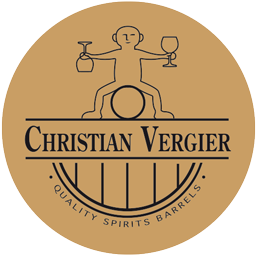Traditional range staples
As the primary instruments in maturing spirits, they alone form the entire basis and identity of a production company. When chosen well, they will sensitively and accurately accompany the future spirit throughout its maturation process.
They will successfully impart richness and complexity to the end product while giving the brand that brings it to life, both style and personality.
Made from French oak, from small to large grain, or from American white oak, they traditionally have a capacity of 400 litres, but smaller sizes are also available.
The choice of toasting will then be individually tailored to demand, taking into account the nature of the spirit to be matured and the ultimate objective.
Some general information about our toasts
Chateau toast
This is a long toast that is particularly respectful of the original character of the
brandy. It adds little colour but rather structure and fullness when coupled with French oak and fresh, spicy notes in its American oak version.
This toast is well-suited to delicate brandies. It is ranked from 1 to 4, with the number rising depending on the intensity of the toast.
Tradition toast
This is a classic, direct flame toast. Combined with French oak, it imparts structure and drive along with fruity and empyreumatic notes. With American oak, it develops roundness, sweetness and an accompanying array of vanilla and exotic notes. Suitable for traditional brandy maturation. It is ranked from 1 to 4, with the number rising depending on the intensity of the toast.
Vintage toast
This is a very long, gentle toast which substantially modifies the nature of the wood. Depending on the intensity of the toast selected, it adds colour and structure, power and drive as well as an interesting range of aromatics specific to the nature of the oak used. This toast is well-suited to characterful brandies. It is ranked from 1 to 4, with the number rising depending on the intensity of the toast.
Technical casks
They respond to specific requirements voiced by the cellar master. With the ability to correct profiles, optimise oxidation and guide aromatic or sensory characters, they represent an alternative to traditional maturation practices.
Made from a specific selection of oak woods and a wide range of exotic woods, technical casks can play around with formats and shapes and are designed as a novel and unique response to the various issues thrown up by successful oak ageing.
Micro distilling or the science of optimisation
Perfectly adapted to small production units, this range of barrels offers a customised response to the constraints of precise, differentiated and optimised maturation.
Based on a capacity of 150 to 200 litres, they are available in several origins of oak wood and a number of toasts, all of them suited to the various types of desired end product.
Smaller formats are also available for smaller firms or experimentation purposes.
Rare barrels: Terroir barrels offering unique characters
Designed by expert coopers, their aim is to reconnect with sense of place – terroir – or ancient toasting techniques.
They offer the pleasure of rediscovering the effects on modern-day spirits of certain techniques that have virtually been forgotten, or simply abandoned.
They are rare because they are produced on a boutique scale but lend undeniable breed and a distinct character to the end product.
The choice of toast is also tailored to individual needs.
Used casks and finishing casks
A new cask is considered as such for four years, but is subsequently described as an used cask until its twenty-fifth year. Its tannin content then becomes limited, but it still offers interesting micro oxidative qualities that are essential for lengthy and ambitious maturation processes.
Used casks are the vital companions of new casks, and essential auxiliaries for any serious maturation programme.
Just like new barrels, they need to be carefully chosen, and their proportion properly judged in order to act as the perfect assistants to their new counterparts.
These second-hand casks have only been used for spirits and are selected with rigour and skilfulness.
The so-called finishing formats are selected entirely on the basis of their ability to put an aromatic stamp on the products they contain.
Very unsuitable for lengthy maturation practices, they are generally used during the last months of maturation.
As second-hand casks by definition, they have previously contained various wines or spirits with strong characteristics such as Port, whisky and Moscatel.






